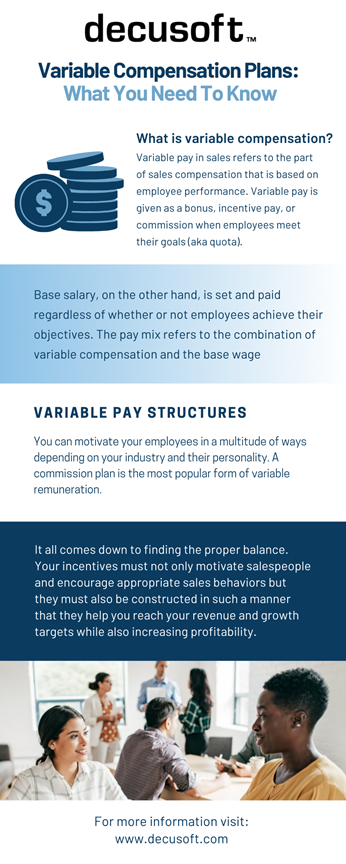Incentive pay systems are commonly used to boost employee productivity and efficiency, but they may also be used to boost employee recruitment, engagement, retention, and brand recognition. The premise behind incentive pay and recognition programs is that rewards drive people to act in specific ways. Employee incentive pay systems, when utilized in the workplace by senior management, allow organizations to achieve specific goals by rewarding individuals who are responsible for attaining them. Variable pay refers to the portion of an employee’s remuneration that is determined by their performance (commonly a commission).
Variable pay in sales refers to the part of sales compensation that is based on employee performance. Variable pay is given as a bonus, incentive pay, or commission when employees meet their goals (aka quota). The base salary, on the other hand, is set and paid regardless of whether or not employees achieve their objectives. The pay mix refers to the combination of variable compensation and the base wage.
Variable Pay Structures
You can motivate your employees in a multitude of ways depending on your industry and their personality. A commission plan is the most popular form of variable remuneration. Your objective should be to incentivize employee performance and encourage salespeople to fulfill their quotas regardless of the sort of variable compensation you use. The approach and eligibility requirements should be understood by all employees. It’s also critical to define precise goals and success criteria that employees must fulfill in order to be eligible for the perk. Regularly check in with the team to see how happy they are with the payment plan and whether it is increasing employee motivation.
Sales commission systems set out the road to variable compensation for sales reps and workers. Representatives generally receive commissions as a proportion of the sale they close. These structures might be set at a fixed fee, based on gross margin, or based on quota fulfillment percentage (multiplier structure).
A tiered commission system is the most typical commission structure. Reps receive a percentage dependent on the number of transactions they close under this variable compensation system. However, when salespeople complete more transactions and work toward quota, they progress through the commission tiers.
Some firms opt for a bonus structure instead of a commission structure. There are numerous distinctions to be made between bonus and commission. Commissions, for example, are usually paid in addition to basic income in each pay period. Bonuses may be paid every pay period, quarterly, or yearly, depending on how bonuses are set up.
Furthermore, performance is usually connected to incentives and commissions. Bonuses, on the other hand, are typically a fixed amount, whereas commissions might fluctuate depending on individual performance.
MBOs, or Management by Objectives, assist employees in setting personal goals in order to earn incentive compensation. This is a common method of earning variable compensation for non-sales or non-commission personnel.
Individual employees and their managers often set these goals for how they may contribute in their position and/or develop beyond their day-to-day tasks. MBOs frequently foster cooperation and embrace unique, creative ideas that will aid the firm in achieving its objectives.
How to Put Your Compensation Plan into Action
Sales compensation variable pay should inspire salespeople to close agreements since money motivates them. You may build a direct relationship between outcomes and compensation by rewarding or paying for rep performance, which is one of the most effective ways for organizations to drive sales teams to meet targets.
More significantly, in order to meet corporate objectives, your variable compensation structure must encourage the proper sales behaviors. Variable compensation pay is a fantastic motivator, but without effective execution and the right pay mix, it can fall flat.
If your sales force is offered an opportunity that is overly reliant on incentive compensation, you risk encouraging representatives to work autonomously and maybe avoid taking risks for the company. If salespeople aren’t compensated based on their performance, they may not be motivated to work hard enough.
Determining Your Compensation Strategy
Here are a few pointers to consider while determining your compensation strategy and establishing sales compensation plans in order to properly manage your system:
- Sales Compensation
Individual incentives are based on the performance of the individual. This type of incentive is often used to help retain top performers. This incentive plan helps ensure compensation is commensurate with employee accomplishment. Individual incentives are appropriate for a society that values individualism and is prevalent in western cultures.
- Individual Achievement-Based Variable Incentive Compensation
Sales representatives should be held accountable for items they can influence. Putting an individual’s salary on the line depending on team performance may not be regarded as fair, and it might lead to more turnover.
- Stay Away From a Skewed Variable-Pay System.
The degree of variable pay incentives is frequently determined by the function of the sales team. When you have more influence over your performance, for example, variable pay is higher. Because the account executive has a greater direct effect on the deal closure than, say, a customer success person, the account executive will generally have the highest variable pay level on the team.
Your team consists of a diverse set of resources. Because no two sales jobs are alike, variable compensation should be based on the duties of each. While they all have the same broad aims, they are not all responsible for the same things. Compensation based on job function allows companies to focus on the capabilities of each position. This enables you to
Variable Performance & Pay Mix Effects
Winning businesses recognize the value of incentive pay and strive to provide competitive remuneration in order to decrease turnover and retain top employees.
It all comes down to finding the proper balance. Your incentives must not only motivate salespeople and encourage appropriate sales behaviors but they must also be constructed in such a manner that they help you reach your revenue and growth targets while also increasing profitability.




